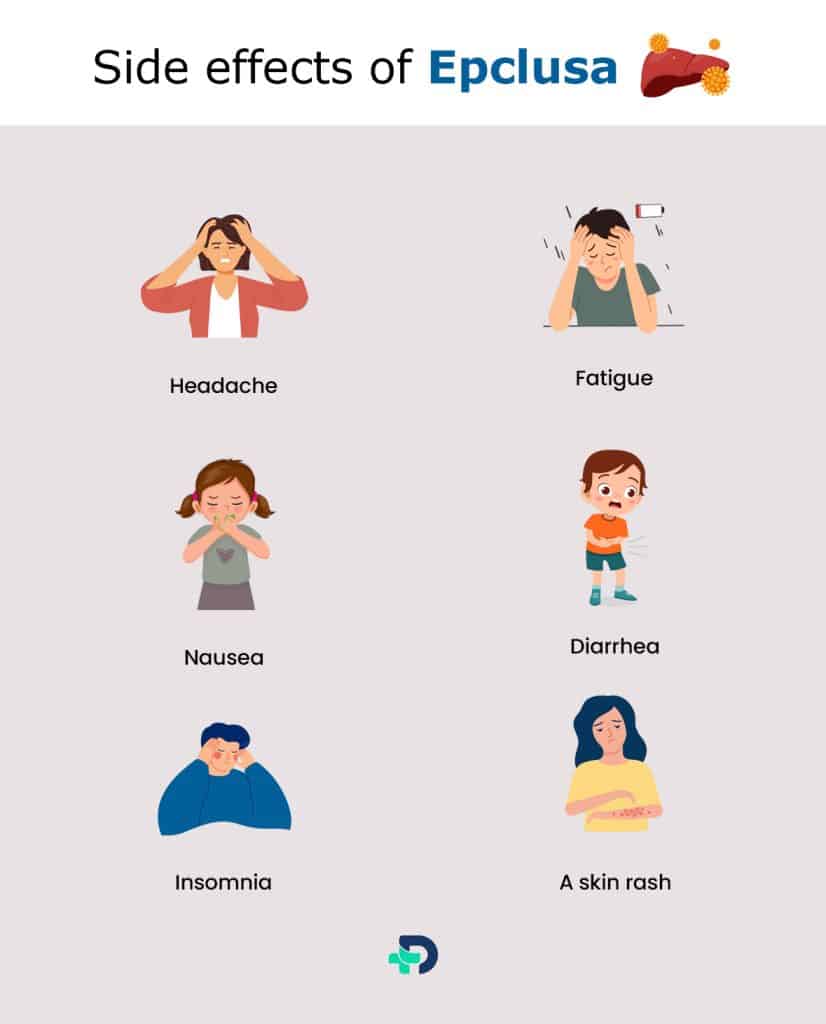Epclusa: Uses, Side effects and Interactions

- Epclusa
- 17 Aug 2023
Overview
About Epclusa
A medicine called Epclusa is used to treat chronic hepatitis C virus (HCV) infection. Sofosbuvir and velpatasvir, two of its active components, are combined.
Hepatitis C virus infection affects millions of people globally and has a significant negative impact on public health. For those facing chronic hepatitis C, epclusa gives new hope.
The main characteristics, advantages, effectiveness of the treatment, and potential adverse effects will all be covered in this article. Patients and healthcare professionals can choose the best HCV treatment by being informed about the impact of this breakthrough medicine.

Uses
Epclusa uses
Adults with a chronic hepatitis C virus infection are the main target population for this medication. It offers patients with various virus genotypes a pan-genotypic treatment option.
Here are a few of the primary uses:
- Treats Chronic Hepatitis C
- Helps in Liver disease management
Treatment for chronic hepatitis C
- It is approved for treating chronic HCV infection in both treatment-nave patients (those who have not previously received HCV treatment) and those who have previously received sofosbuvir without NS5A inhibitors or interferon-based regimens. It works well against all prevalent HCV genotypes.
Liver disease management
- It helps in stopping the progression of chronic HCV infection-related liver damage. It can lower the risk of liver cirrhosis, liver failure, hepatocellular cancer, and the requirement for liver transplantation by establishing a persistent virology response, which showed the absence of detectable HCV in the blood six months after completing medication.1Uses| Researched based study from Nlm.nih.gov
Benefits
Benefits of using Epclusa
High success rates
- High cure rates are available; often, they approach 95%. The general health, quality of life, and prognosis of patients can all be enhanced by this outcome.
Effectiveness across all genomes
- Its unique formulation makes it possible to treat all of the main HCV genotypes successfully.
- This makes choosing a course of therapy easier because it eliminates the need for genotype testing, as one drug can treat a variety of HCV genotypes.
Convenience and simplicity
- It is a practical treatment choice for patients because it is a once-daily oral pill. Depending on the patient’s characteristics and prior medical history, it has a shorter treatment time than older interferon-based medicines, often lasting 8 to 12 weeks.1Benefits| Researched based study from Nlm.nih.gov ,3Benefits| Researched based study from Nlm.nih.gov
Side effects

Side effects of Epclusa
- Headache
- Fatigue
- Nausea
- Diarrhea
- Insomnia
- Skin rash
Although generally well accepted, it can negatively affect some people, much like other medications. It’s important to keep in mind that not everyone will get these. Here are a few typical examples:
Headache
- While receiving treatment, mild to moderate headaches could happen. The majority of the time, these headaches are transient and treatable with over-the-counter painkillers.
Fatigue
- Some people could feel worn out or exhausted. It is advised to get enough sleep and, if tolerated, moderate exercise.
Nausea
- It may result in nausea or a stomach ache. Eating smaller, more frequent meals and avoiding hot or fatty foods could reduce this side effect. Your doctor may occasionally suggest taking drugs to treat nausea.
Diarrhea
- It could happen as an adverse impact. Maintaining hydration and eating a healthy, fiber-rich diet can help control this condition. If you experience severe or persistent diarrhea, you must see a doctor right away.
Insomnia
- Sleeping problems or insomnia may occur in some persons. A regular sleep schedule and excellent sleep habits may assist in alleviating this adverse effect.
- Consult your healthcare practitioner if sleeplessness persists or becomes a problem for more advice.
A skin rash
- Rarely, it might result in allergic reactions or skin rashes. It’s crucial to consult a doctor if you experience a rash, hives, itching, or any other symptoms of an allergic response.1Side effects| Researched based study from Nlm.nih.gov ,2Side effects| Researched based study from Nlm.nih.gov ,3Side effects| Researched based study from Nlm.nih.gov
Interactions
Medicine interaction
It may enhance the chance of a slow heart rate when used with amiodarone. These medications must be taken simultaneously, and your doctor will frequently check your heart rate.
Acid-reducing agents
- It shouldn’t be taken along with acid-reducing drugs like ranitidine, omeprazole, and esomeprazole, as well as H2 receptor antagonists like ranitidine. These could make Epclusa less effective.
Some anti-HIV drugs
- It might interact with drugs like efavirenz, atazanavir, and ritonavir. Drug levels in the blood may change as a result of these interactions. Dose modifications or different types of treatments may be required.
A few anticonvulsants
- Medicines like phenytoin, carbamazepine, and phenobarbital may interact with it. These interactions may lower the blood levels of Epclusa, decreasing its efficacy.
St.John’s Wort
- It is an herbal supplement that can lower the blood level of Epclusa, which could reduce the drug’s effectiveness.
To be sure there are no possible interactions that could influence the safety and efficacy of your drugs, it’s crucial to give your healthcare practitioner a thorough list of all the medications and supplements you are taking.4Interactions| Researched based study from Fda.gov
Precautions
Precautions and warnings
Medical history
- Tell your doctor about your health, including any liver illness, kidney issues, or other diseases. To avoid potential drug interactions, mention any vitamins or medications you take.
Breastfeeding and becoming pregnant
- It is essential to examine the benefits and drawbacks of Epclusa with your doctor if you are currently breastfeeding, plan to become pregnant, or have recently become pregnant.
- Your doctor will decide the best course of action because its safety and effectiveness in pregnant women have not been adequately established.
Allergies
- Be sure to inform your doctor if you have any allergies, especially if you have reacted to sofosbuvir, velpatasvir, or other Epclusa ingredients.
Liver function
- Although it is primarily used to treat chronic hepatitis C, extra safety measures may be required if you have severe liver disease or liver failure.4Precautions| Researched based study from Fda.gov ,1Precautions| Researched based study from Nlm.nih.gov
Duration
How long does it take for Epclusa to start working?
- The length of treatment varies depending on several variables, including the exact HCV genotype and the presence of liver cirrhosis. For most patients, the usual duration of therapy is 12 weeks.
- It frequently has a rapid reduction in HCV levels in the body. There can be noticeable drops in viral load in the first few weeks.
- Even if you see results immediately, finishing the course as directed is crucial. This increases the likelihood of getting a long-lasting virology response. As a result, the virus cannot be found in the blood for at least 12 weeks following the completion of the treatment.3Duration| Researched based study from Nlm.nih.gov ,4Duration| Researched based study from Fda.gov
Overdose
Overdose toxicity
- If you have taken too much medication, you need to get medical attention right away.
- An increased chance of adverse side effects may result from overdosing.
- An overdose’s severity and particular symptoms can differ from person to person.4Overdose| Researched based study from Fda.gov
Bottom Line
The Bottom Line
Epclusa is regarded as a pan-genotypic therapy and has demonstrated efficacy in treating hepatitis C virus infection.
The usage of Epclusa should be discussed with a medical practitioner who can offer specific recommendations based on your medical history and condition, as is essential with any medicine. They will decide whether the drug is appropriate for you, monitor your growth, and address any concerns or questions you may have.
Any feedback on this article?
 This Articles content was accurate
This Articles content was accurate Very Informative Article
Very Informative Article I have a question or a comment
I have a question or a comment
 This article contains inaccurate content
This article contains inaccurate content This article was not helpful
This article was not helpful I have a question or a comment
I have a question or a comment
We appreciate your helpful feedback!
Checkout our social pages
References
-
National Library of Medicine
Sofosbuvir / velpatasvir (Epclusa) for chronic hepatitis C: Overview | Uses | Benefits | Side effects
-
National Library of Medicine
Sofosbuvir-Velpatasvir (Epclusa)-Associated Photosensitivity in a Hepatitis C Patient: Case Report and Review of Photosensitivity to Hepatitis C Antiviral Agents | Side effects
-
National Library of Medicine
Sofosbuvir/Velpatasvir for the treatment of Hepatitis C Virus infection | Side effects
-
U.S FODD & DRUG ADMINISTRATION
EPCLUSA® (sofosbuvir and velpatasvir) tablets, for oral use | Interactions | Precautions | Overdose | Benefits





































